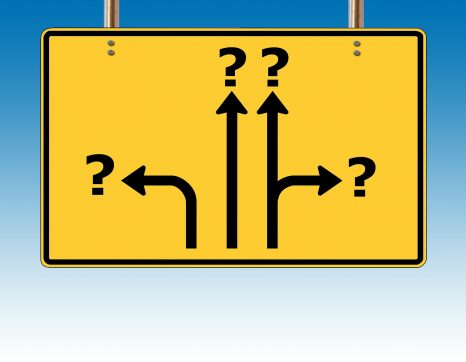

Act on Some of the Facts
FOLLOW US --->
Making any decision without having all of the information and facts beforehand can be very tough. I spoke with a young man recently and he told me that some of his professors had changed the rules on him in the administration of his classes. The syllabuses of a couple of his classes had been altered, which switched exam dates. He was also notified of these changes after the semesterís grace period. The grace period in which he could get his tuition money back after dropping a course had passed. Because of the changes, he would have two to three exams on one day.
I agreed to him that it was not a fair thing for them to do and that he wasnít given all of the facts in order to make an adequate decision. This young man had to make a decision to take the courses the way they had been altered or to drop the courses, forfeit his tuition money and delay another semester until graduation. It was interesting because I was about the same age as this young man when one of my undergraduate professors told me that you are not going to have 100% of the facts needed to make a decision in the real world. He told the class that if weíre lucky, we might have 50% of the facts in order to make a decision. I had told this young man about what my marketing professor had said and he thanked me for this piece of advice.
Months later, I had thought about one of the most drastic decisions anyone has had to make in the 20th Century without having all of the facts before him. Harry Truman became president of the United States in April, 1945 after Franklin Roosevelt died. Roosevelt never informed Truman about the Manhattan Project. Suddenly, Truman had access to three atomic bombs and the authority to use them in World War II against the Japanese. And you think that making some decisions can be tough? Truman had the fate of history in his hands while pondering what to do.
The point is that Truman, like many other decision-makers, was faced with very limited information and had to make a decision and follow-through quickly. At some points in our lives, this happens to us all. But even if you do not decide to do something, your indecision is your decision. Not to decide is to decide.
So, how do you make a decision when you do not have all the facts? Follow this process:
1. Review the facts that you do have. Truman had access to three atomic bombs. Each bomb had enough power to destroy an entire city.
2. Analyze your facts. Truman witnessed the testing of one of the atomic bombs in the desert and was made more aware of the actual intensity of the bomb.
3. Analyze how your facts will affect your future decisions. Truman was given an estimate about the number of American soldiers that might perish in another major battle with Japan. Trumanís option was that the atomic bomb could be used in lieu of attacking a Japanese city and would avoid excessive American casualties.
4. Take action. Truman ordered that the remaining two atomic bombs be used against the Japanese on Hiroshima and Nagasaki. Using both bombs in battle ultimately ended World War II quicker and avoided additional American casualties.
Great decision-makers, like Truman, act when necessary and take full responsibility for their actions. Although the outcome may or may not have been what Truman had planned, a decision was carried out. If Truman did not make a decision, the war would have lingered and more American lives would have been lost. Although the decision may not have been a popular decision at the time, Truman knew it had to be made.
None of us have crystal balls and have access to future information and events. Truman was no different. Although we donít know the exact outcome of a decision, we can take conscious action and make a decision. If we donít decide, someone or something will decide for us. We decide by decision or indecision. Which one will you choose?
Need a business psychologist?

TIM HOISETH


GET OUR E-BOOKS HERE

A Leader Should Be Willing To Take Responsibilities
FOLLOW US --->
Who would forget the ever-famous line of Peter Parkerís grandfather, ìWith great power comes great responsibility.î The society expects Spiderman, a comic book, TV, and movie superhero, to be responsible for saving his town, or even the world, in some instances, from evil because he has super powers.
From all the episodes he appeared in, he never let us down. With the power he possesses, he makes sure to be responsible in using it for the good of the people around him.
Leadership is not at all different from being superheroes. Yes, you may not have super powers like Superman and Spiderman, but you have the authority to lead other people towards success. This is so much greater and stronger since it is a power that can be used by real people in this real world.
Hence, being a leader requires great sense of responsibility, the second quality a successful leader should attain.
The power to lead your people towards aiming your vision comes with responsibilities like making sure they are on the right direction, being aware of each and everyoneís tasks and mistakes, and putting them back on the right track when they get lost.
Who said it is easy to be a leader? Well, it is notÖIt comes with tons of responsibilities. True leaders are willing to accept them all.
There are instances where sometimes it makes us feel better to blame somebody or something else when something goes wrong in a task. However, this should not be practiced, especially by a good leader!
A leader should take full responsibility of a task – not just before he accepts to take it, but also after it has been accomplished. As much as he is responsible for his teamís success, he should also be responsible for any failure. He represents the whole team so whatever happens to it, he is the one responsible.
Making excuses and blaming something or someone else for failed jobs is not a quality of a good leader. What he should do, instead, is to accept the fact that something went wrong with the organization, even if it is not his fault. It is normal to make mistakes. In fact, mistakes are opportunities to learn something better. As a leader, he must ensure that the team members learn from these mistakes and that these errors will not be repeated next time.
You may not have full control over other people and are not expected to have full control over their actions, but you have full control of your own reactions. Knowing what to do over unexpected and unpredictable situations will make you responsible, hence giving you the feeling of power.
Need a business psychologist?

TIM HOISETH



